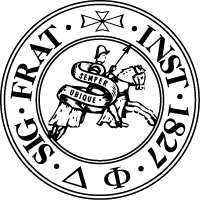
In November of 1827, nine young men sought shelter from the evening chill under the Old Scotia Bridge...

On that night in 1827, our founders contemplated and laid the foundation for the Delta Phi Fraternity. When those nine men reconvened in North College Hall at Schenectady New York's Union College on the seventeenth of November, they consecrated an organization based on study, friendship, and lifelong bonds that has lasted to this day.
Delta Phi, along with Kappa Alpha Society and Sigma Phi Society, comprise the Union Triad - the first three social college fraternities. From these three fraternities at Union College (regarded as the "Mother of Fraternities") can be traced the extensive Greek system seen on nearly every college campus today.
Six years after the founding of Delta Phi, Eliphalet Nott of Union College began a harsh crackdown on fraternities. They were viewed by many who did not belong to them as secret societies engaged in immoral activities. The faculty and administration of Union College banned fraternities and the brothers of Kappa Alpha and Sigma Phi removed their badges and went underground.
Because Delta Phi refused to disband and continued on in the open, it stakes its claim as the oldest, continuous fraternity. An indignant brother named John J. Hyde (Alpha, 1832) fought for a hearing with President Nott. He presented the case for fraternities and encouraged Nott to reverse the ban and allow the groups, secret or otherwise, to continue. John J. Hyde so convincingly argued the case for fraternities before the faculty that Dr. Nott rescinded his proscription of fraternities, allowing them to grow, flourish, and expand to other campuses. For all intents and purposes, he saved the Greek fraternity system as it is known today. Ironically, the irascible Nott’s son later became a Delta Phi when he went to college.


